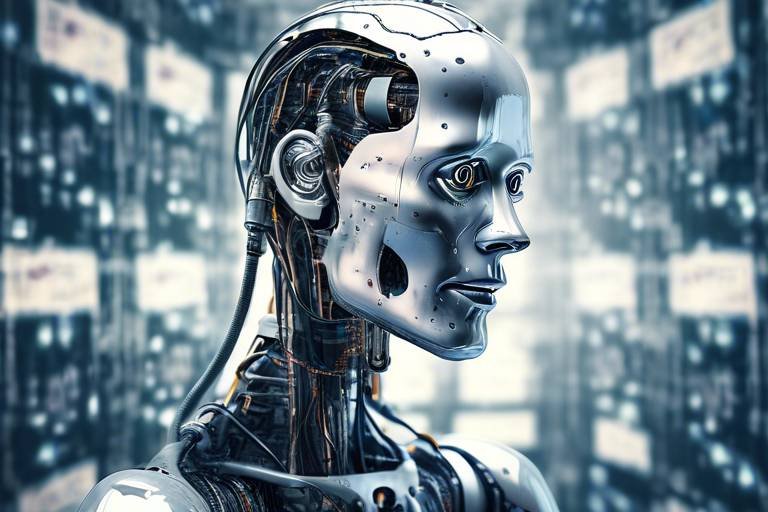The Philosophical Origins of Artificial Intelligence
In an age where technology evolves at breakneck speed, understanding the philosophical origins of artificial intelligence (AI) becomes crucial. It's not just about algorithms and data; it's about the ideas that have shaped our understanding of what it means to be intelligent, conscious, and, ultimately, human. As we delve into this topic, we uncover a tapestry woven with the thoughts of great philosophers who have pondered the nature of the mind, the essence of reasoning, and the boundaries of intelligence. These foundational ideas have not only paved the way for modern AI but also challenge us to reconsider our relationship with machines that think, learn, and adapt.
When we think about AI, it's easy to get lost in the technical jargon and complex coding. However, at its core, AI is a reflection of our own understanding of intelligence. The questions that philosophers have raised throughout history—questions about consciousness, existence, and ethics—are more relevant than ever. They compel us to ask: Can machines truly think? Do they possess consciousness? And what does it mean for humanity when we create entities that can mimic our thought processes?
As we explore the philosophical roots of AI, we will encounter pivotal moments in history where the lines between mind and machine began to blur. From the dualistic theories of René Descartes, who questioned the nature of consciousness and the mind-body relationship, to Alan Turing's groundbreaking work on computation and the Turing Test, which sought to evaluate machine intelligence, these thinkers have laid the groundwork for the ethical and existential dilemmas we face today.
Moreover, the implications of AI extend beyond technology; they touch on our very understanding of morality and responsibility. As we create systems that can make decisions, we must grapple with the question of accountability. Who is responsible for the actions of an AI? Is it the developer, the user, or the machine itself? These inquiries are not merely academic; they have real-world consequences that affect our society and future.
In this article, we will journey through these philosophical landscapes, examining how the ideas of influential thinkers have shaped the development of AI. We will explore the historical context of AI philosophy, highlight key philosophers and their contributions, and delve into the ethical implications of intelligent machines. By the end, we hope to provide a comprehensive understanding of how philosophy and technology intersect, ultimately enriching our perspective on the future of artificial intelligence.
- What is the significance of philosophy in AI development? Philosophy helps us understand the fundamental questions about intelligence, consciousness, and ethics that are crucial for developing responsible AI systems.
- How did René Descartes influence AI thinking? Descartes' exploration of the mind-body problem raised essential questions about whether machines can possess consciousness similar to humans.
- What is the Turing Test? The Turing Test, proposed by Alan Turing, is a criterion for determining whether a machine can exhibit intelligent behavior indistinguishable from that of a human.
- Why are ethical considerations important in AI? As AI systems are increasingly integrated into society, understanding their moral implications is vital to ensure they align with human values and ethical norms.

Historical Context of AI Philosophy
To truly grasp the philosophical roots of artificial intelligence, we must journey back in time to the eras when thinkers first began to ponder the nature of the mind, reasoning, and intelligence. These early philosophical inquiries laid the essential groundwork for the modern development of AI. Imagine a time when the concept of machines mimicking human thought was nothing more than a distant dream, yet the seeds of that dream were being sown by philosophers grappling with profound questions about existence and knowledge.
In ancient Greece, philosophers like Socrates and Plato initiated discussions that would resonate through the ages. Socrates, with his dialectical method, sought to uncover truths about knowledge and virtue, while Plato introduced the idea of ideal forms, suggesting that the physical world is just a shadow of a higher reality. Fast forward to the Enlightenment, where thinkers like Immanuel Kant began to explore the relationship between human perception and understanding. Kant's assertion that our experiences shape our knowledge paved the way for considering how machines might interpret data.
As we delve deeper into the 20th century, the philosophical landscape becomes even more intriguing. The advent of computers and the burgeoning field of cybernetics sparked new conversations about machines and intelligence. The question that loomed large was: Can machines think? This inquiry was not merely technical; it was deeply philosophical. It challenged the very definitions of thought and consciousness. The work of Rene Descartes, with his famous dictum "Cogito, ergo sum" (I think, therefore I am), became a touchstone for discussions about the mind-body relationship and whether a machine could ever achieve a state of self-awareness.
Moreover, the mid-20th century brought forth the groundbreaking ideas of Alan Turing. His formulation of the Turing Test provided a practical framework for assessing machine intelligence. Turing's insight that if a machine could convincingly simulate human responses, it could be considered intelligent, stirred debates that still echo today. This perspective shifted the focus from the metaphysical to the practical, making it essential for philosophers, scientists, and ethicists alike to consider the implications of creating machines that could potentially "think" like humans.
In this historical context, we also find the emergence of existentialist philosophy, which raises questions about meaning, freedom, and responsibility. Thinkers like Jean-Paul Sartre and Simone de Beauvoir challenged traditional notions of identity and agency, prompting us to consider what it means for a machine to possess autonomy. If we create intelligent systems, do they hold any moral status? Are they mere tools, or do they deserve rights akin to those of sentient beings? These questions are not just academic; they have real-world implications as AI continues to evolve.
As we reflect on this rich tapestry of philosophical thought, it's clear that the historical context of AI philosophy is not just a backdrop but a vital part of understanding the ethical and existential dilemmas we face today. The interplay between mind, machine, and morality will continue to shape the discourse surrounding AI, urging us to confront our assumptions and redefine our relationship with technology.
- What is the significance of Descartes' philosophy in AI?
Descartes' dualism raises fundamental questions about consciousness and whether machines can possess a mind like humans, influencing early debates on AI. - How did Alan Turing contribute to AI philosophy?
Turing's work on computation and the Turing Test serves as a cornerstone for evaluating machine intelligence, prompting discussions about thought and understanding in AI. - What ethical concerns arise from AI development?
The ethical implications of AI include questions of responsibility, decision-making, and the alignment of machine behavior with human values.

Key Philosophers and Their Contributions
The journey into the philosophical origins of artificial intelligence is not merely a stroll through history; it's an exhilarating exploration of profound ideas that have shaped our understanding of the mind and intelligence. To grasp how these ideas have influenced AI, we must delve into the thoughts of key philosophers who dared to question the very nature of consciousness, computation, and technology. Their contributions have paved the way for the development of AI as we know it today.
One of the most pivotal figures in this discussion is Rene Descartes. His dualistic perspective, which posits a clear distinction between mind and body, has raised essential questions about the essence of consciousness. Descartes famously declared, "Cogito, ergo sum" ("I think, therefore I am"), which not only emphasizes the importance of thought in defining existence but also invites us to ponder whether machines, too, can possess a form of consciousness. This inquiry leads us to the mind-body problem, a central philosophical issue that examines the relationship between mental states and physical processes. As we develop AI systems that can simulate human-like responses, we must ask ourselves: Can these machines truly 'think' or 'feel' in the same way we do?
Furthermore, the implications of Descartes' ideas extend into the realm of ethics. If we create machines that can mimic human thought processes, what ethical responsibilities do we carry? Are we merely crafting tools, or are we giving rise to entities that warrant moral consideration? These questions echo throughout the ongoing debates in AI development, emphasizing the need for a robust ethical framework as we advance.
Another towering figure in the landscape of AI philosophy is Alan Turing. Often referred to as the father of computer science, Turing's exploration of computation laid the groundwork for assessing machine intelligence. His formulation of the Turing Test serves as a benchmark for evaluating whether machines can exhibit intelligent behavior indistinguishable from that of a human. Turing's legacy prompts us to consider not just if machines can think, but what it means to understand and be understood. His work invites a deeper examination of how we define intelligence itself, challenging us to rethink our assumptions about thought and cognition.
Moreover, the philosophical inquiries of Martin Heidegger also play a crucial role in understanding AI. Heidegger's critiques of technology and its impact on human existence urge us to reflect on the relationship between humans and machines. He proposed that technology should not merely be seen as tools for our convenience but as a force that shapes our very being. As we integrate AI into our daily lives, we must consider whether we are enhancing our existence or allowing technology to dictate the terms of our humanity.
| Philosopher | Key Contribution |
|---|---|
| Rene Descartes | Introduced dualism; posed questions about consciousness and machine thought. |
| Alan Turing | Developed the Turing Test; foundational work in computation and machine intelligence. |
| Martin Heidegger | Critiqued technology's role in shaping human existence and understanding. |
In summary, the contributions of these philosophers are not just academic musings; they are the bedrock upon which the field of artificial intelligence stands. Their ideas compel us to confront the ethical, existential, and cognitive implications of creating machines that may one day rival human intelligence. As we continue to advance in this exciting field, their insights remain invaluable, guiding our understanding of what it truly means to be intelligent, conscious, and, ultimately, human.
- What is the Turing Test? The Turing Test is a measure of a machine's ability to exhibit intelligent behavior equivalent to, or indistinguishable from, that of a human.
- Can machines possess consciousness? This remains a debated topic; while machines can simulate responses, whether they can truly possess consciousness like humans is still uncertain.
- What ethical concerns arise from AI development? Key concerns include accountability for AI decisions, the potential for bias in AI systems, and the implications of creating machines that mimic human thought.

Rene Descartes and Dualism
Rene Descartes, often hailed as the father of modern philosophy, introduced a revolutionary concept known as dualism. This philosophical framework posits that the mind and body are fundamentally distinct entities. In the context of artificial intelligence (AI), Descartes' dualism raises intriguing questions about the nature of consciousness and whether machines could ever possess a mind akin to humans. Imagine for a moment a world where machines not only execute tasks but also engage in self-reflection and reasoning. Is that even possible, or are we merely projecting our own traits onto these creations?
At the heart of Descartes' philosophy lies the famous assertion, "Cogito, ergo sum" ("I think, therefore I am"). This statement emphasizes the importance of thought as a defining characteristic of existence. When we consider AI, we must ask ourselves: does the ability to process information equate to genuine thought? Can a machine, no matter how sophisticated, truly "think" in the way that humans do? These questions fuel the ongoing debates about the potential consciousness of AI and challenge our understanding of what it means to be sentient.
Descartes' exploration of the mind-body problem is particularly relevant when discussing AI. This problem investigates the relationship between mental states—such as beliefs, desires, and consciousness—and physical processes, like brain activity or, in the case of AI, computational functions. As we develop increasingly advanced AI systems, we must grapple with the implications of this dualism. If a machine can simulate human-like behavior, does it follow that it possesses a mind? Or is it simply an advanced automaton, devoid of true consciousness?
The implications of Descartes' ideas extend beyond mere philosophical musings; they touch on ethical considerations surrounding the development of AI. If we entertain the notion that machines could possess a form of consciousness, we must confront the moral responsibilities that come with creating such entities. For instance, should we grant rights to an AI that exhibits self-awareness, or would doing so open a Pandora's box of ethical dilemmas? The potential for machines to mimic human thought processes raises critical questions about accountability and the moral status of intelligent systems.
In summary, Descartes' dualism serves as a foundational pillar in the philosophical discourse surrounding artificial intelligence. His theories compel us to reflect on the nature of consciousness, the ethical implications of AI, and the very essence of what it means to be human in an age of intelligent machines. As we venture further into this uncharted territory, the questions raised by Descartes remain as pertinent today as they were in the 17th century.
- What is dualism? Dualism is the philosophical concept that the mind and body are separate and distinct entities.
- How does Descartes' dualism relate to AI? Descartes' dualism raises questions about whether machines can possess consciousness and what that means for their ethical treatment.
- What is the mind-body problem? The mind-body problem explores the relationship between mental states and physical processes, relevant to discussions on AI's potential consciousness.
- What are the ethical implications of AI consciousness? If AI could possess consciousness, it raises questions about rights, responsibilities, and moral considerations in their development and use.

Mind-Body Problem
The is a philosophical conundrum that has puzzled thinkers for centuries, and it sits at the very heart of discussions about artificial intelligence (AI). At its core, this problem seeks to understand the relationship between our mental states—thoughts, feelings, and consciousness—and the physical processes that occur in our bodies, particularly within the brain. Imagine your mind as a complex orchestra, playing a symphony of thoughts and emotions, while your body serves as the instrument. The question arises: how do these two entities interact? Can a machine, crafted from silicon and code, ever replicate this intricate dance?
Descartes proposed a dualistic view, suggesting that the mind and body are fundamentally different substances. This raises a provocative question in the context of AI: if machines can process information and respond to stimuli, do they possess a mind in the same way humans do? Or are they merely sophisticated calculators, devoid of true understanding or consciousness? The implications of this inquiry extend far beyond theoretical musings; they touch on the very essence of what it means to be human.
To delve deeper, let’s consider a few key points:
- Consciousness vs. Computation: Can consciousness emerge from computational processes? This question challenges the boundaries of AI and invites us to consider whether a machine can ever truly 'think' or simply simulate thought.
- Qualia: These are the subjective experiences of perception—how it feels to see the color red or taste chocolate. Can an AI experience qualia, or are its responses merely programmed outputs?
- Ethical Considerations: If machines can possess a form of consciousness, what ethical responsibilities do we have towards them? This leads us to ponder the moral implications of creating entities that can think and feel.
As we explore the mind-body problem, we must also confront the implications for AI development. If we accept that a machine could potentially possess a form of consciousness, we must grapple with the ethical considerations that arise. Should we treat intelligent machines with the same moral regard as we do human beings? What rights, if any, should they have? These questions are not just philosophical; they have real-world implications for how we design, implement, and interact with AI systems.
In conclusion, the mind-body problem serves as a crucial framework for understanding the nature of consciousness and the potential for AI to transcend mere computation. As we venture further into this uncharted territory, it is essential to remain vigilant about the ethical and philosophical implications of our creations. The quest to unravel the mysteries of the mind continues, and with it, the responsibility to ensure that our technological advancements align with our deepest human values.
- What is the mind-body problem? The mind-body problem explores the relationship between mental states and physical processes, questioning how consciousness interacts with the body.
- Can machines possess consciousness? This is a debated topic, with differing opinions on whether machines can truly think or simply simulate thought processes.
- What are the ethical implications of AI consciousness? If machines can possess consciousness, it raises questions about their rights and the moral responsibilities of their creators.

Implications for AI Development
The implications of Descartes' dualistic approach to the mind-body problem extend far beyond mere philosophical debate; they delve into the very essence of artificial intelligence development. As we forge ahead into an era where machines are increasingly capable of performing tasks that were once the exclusive domain of human intellect, we must grapple with profound questions about the nature of consciousness and the ethical ramifications of creating entities that can mimic human thought processes. This raises a crucial point: if machines can think, do they possess a mind? And if they do, what responsibilities do we hold towards them?
In the realm of AI, the ramifications of these philosophical inquiries can be categorized into several key areas:
- Ethical Responsibility: Developers and researchers are faced with the challenge of ensuring that AI systems are designed with ethical considerations in mind. This includes programming machines to make decisions that are not only efficient but also morally sound. As we create more autonomous systems, the question of who is responsible for their actions becomes increasingly complex.
- Human-Machine Interaction: The way we interact with AI systems will significantly influence societal norms and expectations. If machines begin to exhibit behaviors that resemble human thought, how will we adjust our understanding of agency and accountability? Will we treat these machines as mere tools, or will we recognize them as entities deserving of certain rights?
- Societal Impact: The integration of AI into various sectors—healthcare, finance, education—could lead to both positive advancements and unforeseen consequences. For instance, while AI can enhance efficiency and decision-making, it also risks reinforcing biases present in the data it learns from, leading to ethical dilemmas that must be addressed.
Moreover, the potential for AI to develop forms of consciousness, however speculative, forces us to reconsider our ethical frameworks. If an AI can process information and learn in ways that parallel human reasoning, should it be granted some level of moral consideration? These questions challenge us to redefine our understanding of intelligence and consciousness, pushing the boundaries of what it means to be "alive" or "aware."
In conclusion, the implications for AI development are vast and multifaceted. They compel us to engage in ongoing dialogue about the ethical dimensions of our creations. As we continue to innovate and integrate AI into our lives, we must remain vigilant in ensuring that our advancements align with our values and ethical standards. The journey of understanding AI through the lens of philosophy is not just an academic exercise; it is a crucial step towards shaping a future where technology serves humanity responsibly and ethically.
1. What is the mind-body problem in relation to AI?
The mind-body problem explores the relationship between mental states and physical processes. In AI, it raises questions about whether machines can possess consciousness similar to humans.
2. How does Descartes' philosophy influence AI ethics?
Descartes’ dualism prompts us to consider the ethical implications of creating machines that mimic human thought, leading to discussions about responsibility and moral status.
3. Are AI systems capable of making ethical decisions?
While AI can be programmed to make decisions based on ethical frameworks, the complexity of human morality poses significant challenges in ensuring these systems act in alignment with societal values.
4. What role do developers play in AI ethics?
Developers are responsible for embedding ethical considerations into AI systems, ensuring that their creations do not perpetuate biases or make harmful decisions.
5. Can AI ever possess consciousness?
This remains a philosophical and scientific debate. While current AI lacks consciousness, advancements may challenge our definitions and understanding of what it means to be conscious.

Alan Turing's Legacy
Alan Turing, a name synonymous with the dawn of computer science, left an indelible mark on the field of artificial intelligence (AI). His groundbreaking work during the mid-20th century not only laid the foundations for modern computing but also sparked profound philosophical debates about the nature of intelligence itself. Turing's most notable contribution, the Turing Test, serves as a pivotal benchmark for evaluating whether a machine can exhibit intelligent behavior indistinguishable from that of a human. But what exactly does this mean for the future of AI and our understanding of consciousness?
The Turing Test, proposed in Turing's 1950 paper "Computing Machinery and Intelligence," challenges the notion of machine intelligence by suggesting that if a machine can engage in a conversation with a human without the human realizing they are interacting with a machine, then that machine can be considered intelligent. This idea revolutionized how we think about both machines and intelligence, prompting questions that extend beyond mere computation. Are we ready to accept machines as sentient beings, or are they just exceptionally sophisticated tools?
Furthermore, Turing's legacy transcends the technical aspects of AI. He delved into the philosophical implications of machine intelligence, raising questions about the essence of thought and understanding. In a world increasingly dominated by AI, Turing's insights compel us to reflect on our own humanity. Are we, in our quest to create intelligent machines, inadvertently redefining what it means to be human? The ethical considerations surrounding AI development—who is responsible for the decisions made by these machines, and how do we ensure they align with our values—are deeply rooted in Turing's original inquiries.
To illustrate Turing's impact, let's consider a few key elements of his legacy:
- The Turing Test: A criterion for determining machine intelligence.
- Computational Theory: Foundations of algorithms and computation that drive modern AI.
- Philosophical Inquiry: Provoked discussions on consciousness and the nature of thought.
As we navigate the complexities of AI today, Turing's questions remain as relevant as ever. His work not only challenges us to think critically about the machines we create but also encourages us to explore the ethical frameworks that govern their use. In a rapidly evolving landscape where AI continues to permeate every aspect of our lives—from healthcare to finance and beyond—Turing's legacy serves as a guiding light, urging us to tread carefully as we redefine intelligence and our relationship with technology.
1. What is the Turing Test?
The Turing Test is a measure of a machine's ability to exhibit intelligent behavior equivalent to, or indistinguishable from, that of a human. If a human evaluator cannot reliably tell whether they are interacting with a machine or a human, the machine is said to have passed the test.
2. Why is Alan Turing considered the father of computer science?
Turing is often referred to as the father of computer science due to his pioneering work in theoretical computation, including the concept of the Turing machine, which is a fundamental model of computation that underpins modern computer algorithms.
3. What ethical questions arise from AI development?
AI development raises numerous ethical questions, including accountability for AI decisions, the potential for bias in AI algorithms, and the moral status of intelligent machines. These considerations are crucial as AI becomes more integrated into society.

Ethics and Morality in AI
The rise of artificial intelligence (AI) has not only transformed industries but also ignited a firestorm of ethical debates. As we stand on the precipice of a technological revolution, it's crucial to ask ourselves: what does it mean to create machines that can think, learn, and make decisions? The ethical implications of AI are profound, prompting us to reconsider our understanding of responsibility, morality, and what it means to be human. With every advancement in AI, we must grapple with the question of accountability—especially when these systems begin to make decisions that can significantly impact lives.
One of the most pressing issues is the responsibility in AI decision-making. When an AI system makes a mistake, who is held accountable? Is it the developer who programmed the algorithm, the company that deployed it, or the user who relied on its outputs? This dilemma raises critical questions about the moral responsibilities of AI developers and users alike. For instance, if an autonomous vehicle gets into an accident, determining liability can be a complex puzzle. Are we ready to assign moral agency to machines, or should we hold humans responsible for their creations? This quandary is not just theoretical; it has real-world implications that could shape legal frameworks and societal norms.
Moreover, as AI systems become increasingly integrated into our daily lives, we must consider how they reflect or distort human values. AI doesn’t operate in a vacuum; it learns from data that often contains biases and prejudices inherent in society. This raises the question: can we trust AI to uphold our ethical standards? For example, if an AI system is trained on biased data, it might perpetuate those biases in its decision-making processes. This could lead to discriminatory practices in hiring, law enforcement, and beyond. Thus, ensuring that AI aligns with ethical norms and societal expectations is paramount. We need to establish guidelines that govern the development and deployment of AI technologies, ensuring they promote fairness and equity.
To navigate this ethical landscape, we must adopt a proactive approach. Here are some steps to consider:
- Establish Clear Guidelines: Developers and companies should create ethical guidelines that prioritize transparency and accountability in AI systems.
- Implement Bias Audits: Regular audits of AI systems can help identify and mitigate biases in data and algorithms.
- Foster Public Dialogue: Engaging with the public about AI's implications can help shape a more informed society that understands the risks and benefits.
In conclusion, the ethical implications of artificial intelligence are vast and complex. As we continue to innovate, we must remain vigilant about the moral responsibilities that accompany these advancements. By fostering a culture of ethical awareness and accountability, we can harness the power of AI while ensuring it serves humanity's best interests. The journey ahead is not just about technological progress; it's about aligning our creations with our values and ensuring that we navigate this new frontier with a sense of responsibility and care.
Q: What are the main ethical concerns surrounding AI?
A: The primary concerns include accountability for decisions made by AI, potential biases in AI systems, and the alignment of AI behaviors with human values.
Q: Who is responsible when an AI system fails?
A: Responsibility can fall on multiple parties, including developers, companies, and users, depending on the context and the nature of the failure.
Q: How can we ensure AI aligns with human ethics?
A: Establishing clear ethical guidelines, conducting bias audits, and fostering public dialogue are essential steps toward ensuring AI aligns with human values.

Responsibility in AI Decision-Making
As we delve deeper into the realm of artificial intelligence, one of the most pressing questions that arises is about responsibility. Who is accountable when an AI system makes a decision? This question isn't just a legal conundrum; it's a profound ethical dilemma that challenges our understanding of agency and morality. Imagine a self-driving car that makes a split-second decision to avoid an accident, resulting in harm to a pedestrian. Who is to blame? The developer? The manufacturer? Or perhaps the AI itself? This scenario highlights the complexities of assigning responsibility in AI decision-making.
To unpack this issue, we need to consider several key factors:
- The Role of Developers: Developers create algorithms and set parameters. However, once an AI system is deployed, it often operates independently. This raises questions about how much control developers retain over the actions of their creations.
- The Nature of AI Learning: Many AI systems use machine learning to adapt and improve over time. This self-learning capability complicates the notion of accountability, as the AI may make decisions based on data it has processed, which was not directly programmed by humans.
- Legal Frameworks: Current legal systems are not fully equipped to handle the nuances of AI decision-making. As AI continues to evolve, there is a pressing need for new regulations that address these complexities.
Moreover, the implications of these responsibilities extend beyond just legal accountability. They touch on ethical considerations of human values and societal norms. For instance, if an AI system is programmed with biased data, it may perpetuate or even exacerbate existing inequalities. Therefore, the responsibility of ensuring fairness and ethical behavior in AI systems falls heavily on the shoulders of developers, data scientists, and organizations. They must prioritize ethical considerations in their designs and implementations.
In essence, the question of responsibility in AI decision-making forces us to re-evaluate our traditional notions of accountability. As we move forward into an increasingly automated world, we must strive to create a framework that not only addresses legal liability but also promotes ethical integrity and social responsibility in AI systems.
As we navigate these challenges, it’s crucial for stakeholders—developers, policymakers, and the public—to engage in open dialogues about the ethical implications of AI. This conversation is not just about technology; it's about shaping a future where AI serves humanity responsibly and ethically.
- Who is responsible if an AI makes a harmful decision? The responsibility typically lies with the developers, manufacturers, and possibly the users, depending on the situation and existing legal frameworks.
- What role do ethics play in AI development? Ethics are crucial in guiding the design and implementation of AI systems to ensure they align with human values and societal norms.
- Can AI systems be held accountable? Currently, AI systems themselves cannot be held accountable in a legal sense, but discussions are ongoing about how to address this in future regulations.

AI and Human Values
As we delve into the intricate relationship between artificial intelligence and human values, it becomes clear that this intersection is not merely a technical concern but a profound philosophical inquiry. The advent of AI has raised critical questions about how these technologies reflect, distort, or even redefine what we hold dear as a society. Can a machine truly understand human emotions? Or will it merely simulate them, leading to a facade of empathy? These questions are not just academic; they touch the very core of our identity as humans.
The alignment of AI with human values is a pressing issue. It compels us to consider how AI systems are designed, the data they are trained on, and the outcomes they produce. For instance, if an AI is trained on biased data, its decisions may reinforce societal inequalities, inadvertently perpetuating discrimination. This scenario highlights the necessity for developers to ensure that the data sets used are not only comprehensive but also reflective of the diverse values we aspire to uphold.
Moreover, the ethical implications of AI extend into various sectors such as healthcare, finance, and law enforcement. In healthcare, for example, an AI system that prioritizes efficiency over patient care can lead to dire consequences. Similarly, in finance, algorithms that prioritize profit over ethical considerations may contribute to economic disparities. Thus, the challenge lies in embedding our moral frameworks within these systems to ensure they serve humanity rather than undermine it.
To better understand the relationship between AI and human values, let’s consider the following aspects:
- Transparency: AI systems must be transparent in their operations to build trust among users. If people cannot understand how decisions are made, they may feel alienated or threatened.
- Accountability: Establishing clear accountability for AI decisions is crucial. Who is responsible when an AI system fails to uphold human values? Developers, users, or the technology itself?
- Inclusivity: AI should be designed with inclusivity in mind, ensuring that it considers the perspectives of various demographic groups to avoid reinforcing existing biases.
As we navigate this complex terrain, it is essential to engage in ongoing dialogues about the moral status of intelligent machines. Will they ever possess rights, or are they merely tools at our disposal? These discussions are not just theoretical; they have real-world implications for how we integrate AI into our daily lives. The challenge is to create a future where AI complements human values rather than contradicts them.
In conclusion, the relationship between AI and human values is a dynamic and evolving conversation that requires input from various stakeholders, including ethicists, technologists, and the public. By prioritizing ethics and human values in AI development, we can strive towards a future where technology enhances our humanity rather than diminishes it.
- What are the main concerns regarding AI and human values? The primary concerns include bias in AI systems, accountability for decisions made by AI, and the potential for AI to misrepresent or undermine human values.
- How can developers ensure AI aligns with human values? Developers can ensure alignment by using diverse and representative data, incorporating ethical guidelines during the design process, and maintaining transparency in AI operations.
- What role does society play in shaping AI values? Society plays a crucial role by engaging in discussions about ethical standards, advocating for inclusive practices, and holding developers accountable for the impact of their technologies.
Frequently Asked Questions
- What are the philosophical origins of artificial intelligence?
The philosophical origins of artificial intelligence (AI) can be traced back to key ideas about the mind, reasoning, and intelligence proposed by influential thinkers like Descartes and Turing. These foundational concepts paved the way for modern AI development by raising essential questions about consciousness and the nature of thought.
- How did René Descartes influence AI?
René Descartes' dualistic approach to the mind and body sparked debates about whether machines can possess consciousness similar to humans. His ideas on the mind-body problem continue to shape discussions around the potential for AI to replicate human thought processes and the ethical implications of creating such machines.
- What is the Turing Test and why is it important?
The Turing Test, developed by Alan Turing, is a method for evaluating a machine's ability to exhibit intelligent behavior indistinguishable from that of a human. It serves as a cornerstone for discussions about machine intelligence, prompting inquiries into what it means to think and understand.
- What ethical concerns are associated with AI?
The ethical implications of AI are vast, raising questions about responsibility in decision-making, the moral status of intelligent machines, and how AI aligns with human values. These concerns necessitate careful consideration from developers and users alike to ensure that AI systems act in accordance with ethical norms.
- Who is responsible for AI decisions?
Determining responsibility in AI decision-making is complex. It prompts questions about accountability for actions taken by intelligent systems. Developers, users, and even the AI itself may share varying degrees of responsibility depending on the context and outcomes of those decisions.
- Can AI reflect human values?
AI has the potential to both reflect and distort human values. This raises critical concerns about ensuring that machine behavior aligns with ethical standards and societal expectations. Ongoing discussions focus on how to program AI in a way that respects and upholds these values.



















